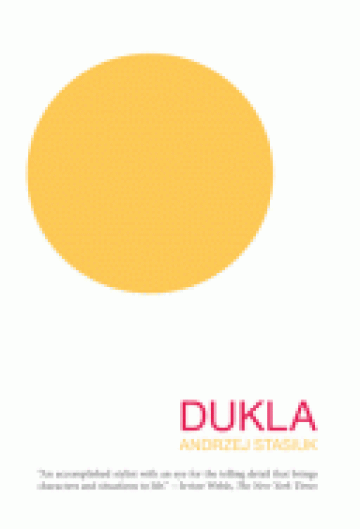DUKLA by Andrzej Stasiuk
You will be reading Dukla (Dalkey Archive Press), Andrzej Stasiuk’s meditation on the titular Polish resort town, and suddenly you will realize you haven’t been reading at all. You’ve been lost in a complicated daydream, entranced by a wash of above-ground light through a subway window, or deep in a series of disconnected thoughts. You’ll wonder how long it has been since you’ve turned a page, and how odd it is that you can drift so easily between Stasiuk’s world and your own. It’s a dynamic borne of Dukla’s structurally strange mosaic of fiction, prose-poetry, literary treatise, confessional and metaphysical meditation.
The styles shift from one to another and give the book the feel of an unchained human imagination stretching itself out. At one point in the book, Stasiuk describes this method as “primitive...like memory, which begins from a single point, a dot, then spins in layers and turns ever widening circles, so as to swallow us up and bring about our ruin in utterly unneeded abundance.”
It’s a fitting description for a book as dense in imagery and sensory detail as this one. Stasiuk presents scenes of both present-day Dukla and the Dukla of his childhood memory with such stylistic force that the business of the scenes themselves often begins to seem trivial compared to Stasiuk’s scene-setting.
In a way, this is the point. The novel is what Stasiuk calls a “book about light”; it’s a paean to images, and the ability of language to clarify them. The question behind Dukla is: if one can bore deeply enough into the surface of a scene—capturing the entire sensory experience of a papal visit, a teen dance, a river journey—is it possible to unveil something more profound?
“I could never imagine things that don’t exist,” Stasiuk writes; “the Unknown…ends up looking like an assemblage of old familiar things in slightly souped-up form.”
It is no surprise, then, that Stasiuk is especially expert at souping up the most ordinary things. He describes the Pope, for example, as almost an afterthought—“white in the darkness”—but he musters a heroic two-page sentence to describe the “concentrated ordinariness” of the town awaiting the man during “the immense aquarium of the afternoon.” As Stasiuk rattles off the faces, the sounds, the smells in the crowd in one immense sidewinder of a phrase, it becomes clear why he criticizes the human imagination throughout the book. Who has time for imagination when there is so much reality take in?
Though the books could hardly be more different stylistically, Dukla at times evokes the beginning of Winesberg, Ohio. In the same way that American classic demonstrated how devastating human drama was possible even in a small backwater town, Stasiuk’s story shows how a similar out-of-the-way hamlet is still capable of delivering a disorienting—and possibly transcendent—sensory experience.
It is difficult to think of a stylistic equivalent to Dukla, especially in English. One can only imagine the difficulty of translator Bill Johnston’s task in retaining Stasiuk’s voice. That said, Johnston succeeded. He has brought American readers a book that will reassure cynics of the continuing potential of the novel form, and will leave them with images of small-town Polish life that won’t easily be forgotten.
Andrzej Stasiuk has received numerous awards for his work, including the NIKE, Poland’s most prestigious literary prize, for his 2004 collection of essays On the Road to Babadag. His 1999 novel Nine was recently published in English to great critical acclaim. Stasiuk also runs a publishing house, specializing in Central and Eastern European prose.
